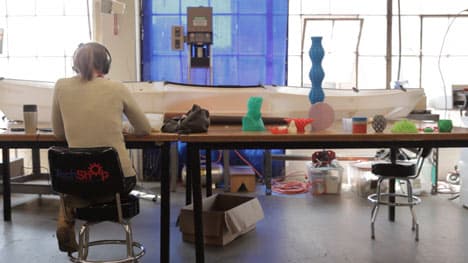Film duo shows maker culture in all its glory

The formidable double feature of ‘Home Made’ and ‘Maker’ totals about 95 minutes. They are very good minutes. They are well-made minutes.
Maker culture, for the uninitiated, is DIY culture with a heightened focus on technology. The ethic that informs and drives maker culture is simple: when we cease to be producers, we solely exist as consumers; when we solely exist as consumers, something is lost. Call it know-how, understanding, craftsmanship, curiosity, or whatever else — you know it when you don’t see it. Technology-based DIY culture seems a natural response to the way production and consumption changed after the industrial revolution. The ubiquity of mass-produced goods, and the relative ease it took to acquire them, divorced everyday people from the manufacturing process. Makers are reclaiming that area piece by piece, and they want you to join them. ‘Home Made', the first of the double feature, is itself a project. It was made my six novice filmmakers under the guidance of a pro (Klaus Elmer). It’s interview heavy, but mostly light; it feels like a first feature — in a charming way. Exploring some of the tools of the trade (3D printers, laser cutters), it’s a great preamble, a satisfying amuse-bouche. It captures the kinetic excitement of Makers and doers. ‘Maker’ (directed by Mu-Ming Tsai) is longer and more complex. The spirit of maker culture is creation, technological and creative know-how; in ‘Maker’ we see the larger implications of that spirit: how new inventions and their inventors are changing societies and indeed economies. “We wanted to hack this physical world in the way we’ve been used to hacking computers,” says an interviewee. Featuring interview footage with some of the most interesting inventors and innovators working in the world today, ‘Maker,’ a Kickstarted project, delves into the whos, whats, and whys. It explores why maker culture is important by showing us extraordinary people and the things they’re creating, prototyping, and putting out into the world. It is, in a word, fascinating. “In the United States, high school shop classes — metal shop and wood shop classes — are gone,” one interviewee says. Another continues: “One reason they used to shut them down was liability. ‘Hey, kids could hurt themselves with these machines.’ But they were probably shut down because people didn’t value that activity as much as they might have.” There’s a very important point, here. We stopped making things because somehow manufacturing became something we regarded as beneath us. Technology allows us to go back to that metaphorical shop class. The ubiquity of technology in our lives, especially consumer technology, often gets a bad rap — “People don’t talk to each other anymore,” some grouse — but without a truly advanced technological age, we wouldn’t be so near so many avenues to Makerism. Today, learning how to program computers is easy and cheap for the layperson; Maker Faires and shared spaces create communities; crowdfunding tests an idea’s validity. As I’m a fledgling member of this community — I started programming again this year after a long hiatus, and am collaborating on various projects currently — very little of the information presented in ‘’Home Made’ and Maker’ was new to me, but the doc was wondrous and enjoyable nonetheless. For people less familiar with maker culture, it will no doubt leave a very deep impression.  Dave Jaffer is The Local's arts and culture writer. He has contributed to countless publications, including Hour, Spinner, Reader's Digest, The Huffington Post, and Exclaim! Cyberstalk him on Twitter at @combatdavey.
Dave Jaffer is The Local's arts and culture writer. He has contributed to countless publications, including Hour, Spinner, Reader's Digest, The Huffington Post, and Exclaim! Cyberstalk him on Twitter at @combatdavey.
Comments
See Also
Maker culture, for the uninitiated, is DIY culture with a heightened focus on technology. The ethic that informs and drives maker culture is simple: when we cease to be producers, we solely exist as consumers; when we solely exist as consumers, something is lost. Call it know-how, understanding, craftsmanship, curiosity, or whatever else — you know it when you don’t see it.
Technology-based DIY culture seems a natural response to the way production and consumption changed after the industrial revolution. The ubiquity of mass-produced goods, and the relative ease it took to acquire them, divorced everyday people from the manufacturing process. Makers are reclaiming that area piece by piece, and they want you to join them.
‘Home Made', the first of the double feature, is itself a project. It was made my six novice filmmakers under the guidance of a pro (Klaus Elmer). It’s interview heavy, but mostly light; it feels like a first feature — in a charming way. Exploring some of the tools of the trade (3D printers, laser cutters), it’s a great preamble, a satisfying amuse-bouche. It captures the kinetic excitement of Makers and doers.
‘Maker’ (directed by Mu-Ming Tsai) is longer and more complex. The spirit of maker culture is creation, technological and creative know-how; in ‘Maker’ we see the larger implications of that spirit: how new inventions and their inventors are changing societies and indeed economies. “We wanted to hack this physical world in the way we’ve been used to hacking computers,” says an interviewee.
Featuring interview footage with some of the most interesting inventors and innovators working in the world today, ‘Maker,’ a Kickstarted project, delves into the whos, whats, and whys. It explores why maker culture is important by showing us extraordinary people and the things they’re creating, prototyping, and putting out into the world. It is, in a word, fascinating.
“In the United States, high school shop classes — metal shop and wood shop classes — are gone,” one interviewee says. Another continues: “One reason they used to shut them down was liability. ‘Hey, kids could hurt themselves with these machines.’ But they were probably shut down because people didn’t value that activity as much as they might have.”
There’s a very important point, here. We stopped making things because somehow manufacturing became something we regarded as beneath us. Technology allows us to go back to that metaphorical shop class. The ubiquity of technology in our lives, especially consumer technology, often gets a bad rap — “People don’t talk to each other anymore,” some grouse — but without a truly advanced technological age, we wouldn’t be so near so many avenues to Makerism. Today, learning how to program computers is easy and cheap for the layperson; Maker Faires and shared spaces create communities; crowdfunding tests an idea’s validity.
As I’m a fledgling member of this community — I started programming again this year after a long hiatus, and am collaborating on various projects currently — very little of the information presented in ‘’Home Made’ and Maker’ was new to me, but the doc was wondrous and enjoyable nonetheless. For people less familiar with maker culture, it will no doubt leave a very deep impression.
Join the conversation in our comments section below. Share your own views and experience and if you have a question or suggestion for our journalists then email us at [email protected].
Please keep comments civil, constructive and on topic – and make sure to read our terms of use before getting involved.
Please log in here to leave a comment.